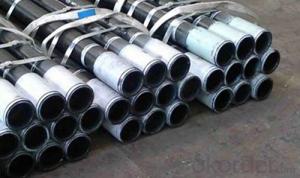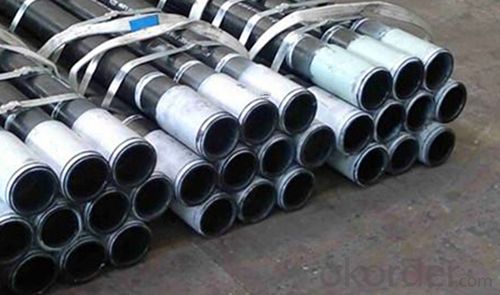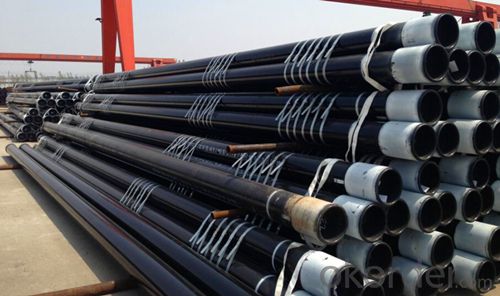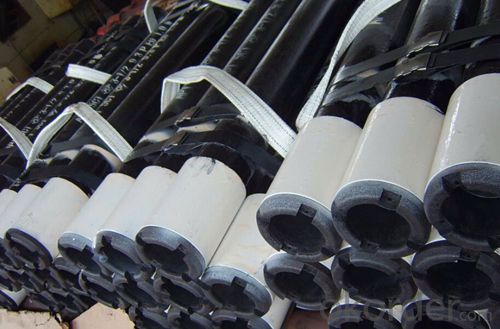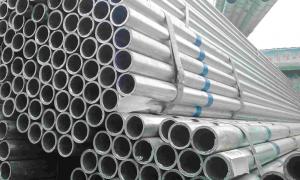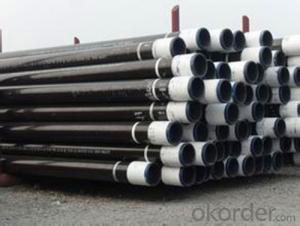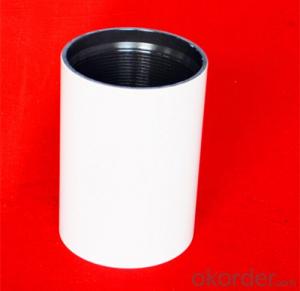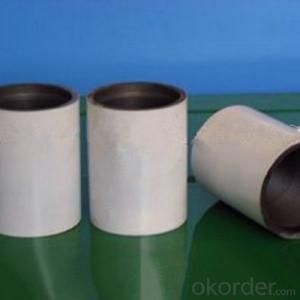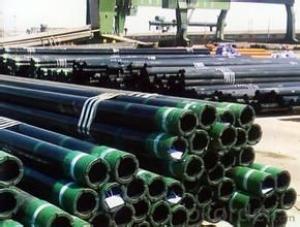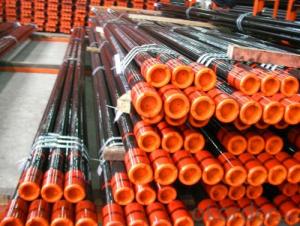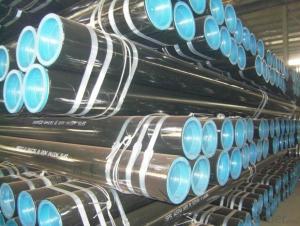Tubing Pipe of Grade P110 with API Standard
- Loading Port:
- Qingdao
- Payment Terms:
- TT OR LC
- Min Order Qty:
- 20 m.t.
- Supply Capability:
- 2000 m.t./month
OKorder Service Pledge
OKorder Financial Service
You Might Also Like
1. Structure of Tubing Pipe of Grade P110 Description
API 5CT Steel Pipe, P110 Oil/Petroleum tubing Pipe
1) Size: O.D. 1.900", 2-3/8", 2-7/8", 3-1/2", 4-1/2"
2) Grade: P110
3) Wall thickness: 3.18 - 10.54mm
4) Length: R1,R2,R3
5) Thread: 8RD and 10RD
6) All our Tubing accord with API SPEC 5CT standard.
2. Main Features of Tubing Pipe of Grade P110
1) Advanced test for quality
2) MTC, COC provided
3) Supervision is welcome
3. Tubing Pipe of Grade P110 Images
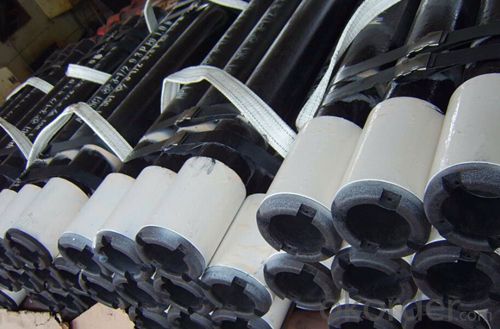
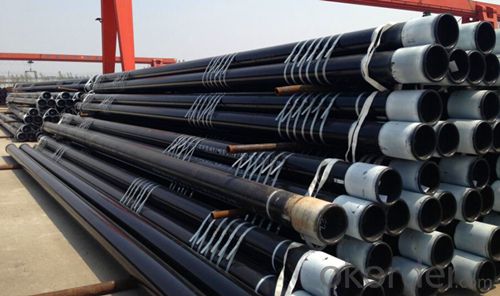
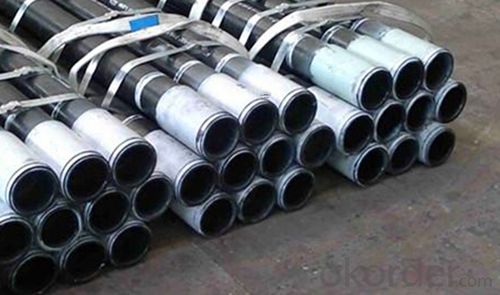
4. Tubing Pipe of Grade P110 Specification
Size Destination | Weight Destination | Outside Diameter | Wall Thickness | Type of End Finish | ||||||||
Grade | ||||||||||||
T&C Non-Upset | T&C External Upset | in | mm | in | mm | J55 K55 | L80 | N80 | C90 | T95 | P110 | |
1.900 | 2.40 | - | 1.900 | 48.26 | 0.125 | 3.18 | PI | - | - | - | - | - |
2.75 | 2.90 | 0.145 | 3.68 | PNUI | PNUI | PNUI | PNUI | PNUI | - | |||
3.65 | 3.73 | 0.200 | 5.08 | PU | PU | PU | PU | PU | PU | |||
4.42 | - | 0.250 | 6.35 | - | P | - | P | P | - | |||
5.15 | - | 0.300 | 7.62 | - | P | - | P | P | - | |||
2 3/8 | 4.00 | - | 2.375 | 60.3 | 0.167 | 4.24 | PN | PN | PN | PN | PN | - |
4.00 | 4.70 | 0.190 | 4.83 | PNU | PNU | PNU | PNU | PNU | PNU | |||
5.80 | 5.95 | 0.254 | 6.45 | - | PNU | PNU | PNU | PNU | PNU | |||
6.60 | - | 0.259 | 7.49 | P | P | P | P | P | - | |||
7.35 | 7.45 | 0.336 | 8.53 | PU | PU | PU | PU | PU | - | |||
2 7/8 | 6.40 | 6.50 | 2.875 | 73.02 | 0.217 | 5.51 | PNU | PNU | PNU | PNU | PNU | PNU |
7.80 | 7.90 | 0.276 | 7.01 | - | PNU | PNU | PNU | PNU | PNU | |||
8.60 | 8.70 | 0.308 | 7.82 | - | PNU | PNU | PNU | PNU | PNU | |||
9.35 | 9.45 | 0.340 | 8.64 | - | PU | - | PU | PU | - | |||
10.50 | - | 0.392 | 9.96 | - | P | - | P | P | - | |||
11.50 | - | 0.440 | 11.18 | - | P | - | P | P | - | |||
3 1/2 | 7.70 | - | 3.500 | 88.9 | 0.216 | 5.49 | PN | PN | PN | PN | PN | - |
9.20 | 9.30 | 0.254 | 6.45 | PUN | PUN | PUN | PNU | PNU | PUN | |||
10.20 | - | 0.289 | 7.34 | PN | PN | PN | PN | PN | - | |||
12.70 | 12.95 | 0.375 | 9.53 | - | PUN | PUN | PNU | PNU | PUN | |||
14.30 | - | 0.430 | 10.92 | - | P | - | P | P | - | |||
15.50 | - | 0.476 | 12.00 | - | P | - | P | P | - | |||
17.00 | - | 0.530 | 13.46 | - | P | - | P | P | - | |||
4 | 9.50 | - | 4.00 | 101.6 | 0.226 | 5.74 | PN | PN | PN | PN | PN | PN |
10.70 | 11.00 | 0.262 | 6.65 | PU | PU | PU | PU | PU | PU | |||
4 1/2 | 12.60 | 12.75 | 4.500 | 114.3 | 0.271 | 6.88 | PNU | PNU | PNU | PNU | PNU | - |
15.20 | - | 0.337 | 8.56 | - | P | - | P | P | - | |||
17.00 | - | 0.380 | 9.65 | - | P | - | P | P | - | |||
18.90 | - | 0.430 | 10.92 | - | P | - | P | P | - | |||
21.50 | - | 0.500 | 12.70 | - | P | - | P | P | - | |||
23.70 | - | 0.560 | 14.22 | - | P | - | P | P | - | |||
26.10 | - | 0.630 | 16.00 | - | P | - | P | P | - | |||
5. FAQ of Tubing Pipe of Grade P110
We have organized several common questions for our clients,may help you sincerely:
①How about your company?
One of the leading manufacturers and suppliers specializing in steel pipe products in China, mainly offering four series steel pipes including welded steel pipe (ERW, SSAW, LSAW and square and rectangle pipe), seamless steel pipe, hot dipped galvanized steel pipe and steel pipe with 3 layer polythene coating. We can provide customers different specification standards e.g. ASTM A53, ASTM A106, BS1387, API 5L, API 5CT, ISO3183 and etc. Our scope of supplying covers from 1/2" to 48" for the outside diameter of welded pipes, and 1/8" to 20" for the seamless pipes.
Other than steel pipes we are also capable of supplying a wide variety of pipeline accessories, steel pipe fittings; valves etc. consists of our one-stop sales. The integrated sales & service ensures customers with various demands an easier access for purchasing management.
②How to guarantee the quality of the products?
We have established the international advanced quality management system,every link from raw material to final product we have strict quality test;We resolutely put an end to unqualified products flowing into the market. At the same time, we will provide necessary follow-up service assurance.
③How long can we receive the product after purchase?
In the purchase of product within three working days, We will arrange the factory delivery as soon as possible.
- Q: How does the price of steel pipes vary based on size and grade?
- The price of steel pipes varies based on their size and grade. Generally, larger pipes tend to have higher prices due to the increased amount of materials and manufacturing processes involved. Additionally, the grade of steel used in the pipes also affects the price, with higher-grade steel pipes being more expensive. This is because higher-grade steel offers better strength, durability, and corrosion resistance, making it suitable for specialized applications. Therefore, the price of steel pipes increases as both the size and grade increase.
- Q: What are the different types of steel pipe connections?
- There are several types of steel pipe connections, including threaded connections, welded connections, flanged connections, and grooved connections.
- Q: What is the impact of steel pipe size on flow rate and pressure?
- The size or diameter of a steel pipe has a significant impact on both flow rate and pressure. Firstly, the flow rate refers to the volume of fluid that can pass through the pipe per unit of time. A larger pipe diameter allows for a greater flow rate as there is more space for the fluid to move through. This is due to the fact that a larger cross-sectional area of the pipe offers less resistance to the flow of fluid. Therefore, increasing the size of the steel pipe will generally lead to an increase in flow rate. Secondly, the pressure within a pipe is influenced by its size. As the fluid flows through a pipe, it encounters resistance due to friction against the walls of the pipe. This resistance leads to a pressure drop along the length of the pipe. A smaller pipe diameter results in higher frictional losses, which leads to a greater pressure drop. On the other hand, a larger pipe diameter reduces frictional losses and therefore results in a lower pressure drop. Consequently, increasing the size of the steel pipe will generally lead to a decrease in pressure drop. It is important to note that while increasing the size of a steel pipe may generally result in a higher flow rate and lower pressure drop, there are other factors that can also affect these parameters. These include the fluid properties, the length and layout of the pipe, and any additional components such as valves or fittings. Therefore, it is crucial to consider all these factors and conduct proper calculations or simulations to accurately determine the impact of steel pipe size on flow rate and pressure in a specific system.
- Q: Are steel pipes suitable for underground irrigation pumping?
- Yes, steel pipes are generally suitable for underground irrigation pumping. They are durable, resistant to corrosion, and can withstand high pressure. Additionally, steel pipes provide excellent flow capacity, ensuring efficient water distribution for irrigation purposes.
- Q: How do steel pipes handle vibrations?
- The effectiveness of handling vibrations is a well-known attribute of steel pipes. Their strong and rigid nature enables them to withstand various types of vibrations, including mechanical vibrations and seismic activities. The structural integrity and strength of steel pipes are responsible for their resilience. Steel pipes possess high tensile strength, which allows them to resist deformation or breakage when exposed to vibrations. They also exhibit resistance to fatigue, meaning they can endure repeated vibrations without suffering significant damage. This quality makes steel pipes ideal for applications involving constant or cyclic vibrations, such as in industrial settings or for fluid transportation through pipelines. Furthermore, steel pipes have the added advantage of being able to dampen vibrations due to their mass. The weight of the steel pipe aids in absorbing and dissipating the energy generated by vibrations, preventing excessive movement or oscillation. This damping effect contributes to the overall stability and durability of the pipe system. Various measures can be taken to further enhance the ability of steel pipes to handle vibrations. These measures may include the utilization of vibration isolators or dampers, which are devices designed to reduce the transmission of vibrations from the surrounding environment. Additionally, proper installation techniques and regular maintenance can help ensure that steel pipes continue to function optimally under conditions prone to vibrations. In conclusion, steel pipes possess the necessary attributes to effectively handle vibrations, including strength, resistance to fatigue, and the ability to dampen vibrations. Their robustness and durability make them a reliable choice for applications where vibrations are a concern, guaranteeing the safe and efficient transportation of fluids or materials.
- Q: How are steel pipes used in oil and gas industry?
- Steel pipes are widely used in the oil and gas industry for various applications. They serve as the primary means of transporting oil and gas from production sites to refineries and distribution centers. Steel pipes are also used for drilling operations, providing a conduit for drilling fluids and facilitating the extraction process. Additionally, they are utilized in the construction of storage tanks, offshore platforms, and pipelines, ensuring the safe and efficient transportation of oil and gas across long distances.
- Q: How do steel pipes withstand high pressure and temperature?
- The inherent properties and construction of steel pipes enable them to endure high pressure and temperature. Steel's strength and durability make it an ideal material for demanding applications. To begin with, steel pipes are crafted from top-notch steel alloys specifically engineered to withstand harsh conditions. These alloys are selected for their high tensile strength, enabling the pipes to withstand the internal pressure exerted by fluids or gases flowing through them. Often, steel used in these pipes is alloyed with elements like chromium, molybdenum, or nickel to enhance its resistance to corrosion and high temperatures. Furthermore, the construction of steel pipes plays a vital role in their ability to withstand high pressure and temperature. Typically, steel pipes are manufactured through seamless or welded processes. Seamless pipes are made by piercing a solid steel billet, resulting in a continuous and uniform pipe without any seams or joints. This seamless construction eradicates weak points and guarantees that the pipe can handle high pressure with no risk of leakage. On the other hand, welded pipes are created by joining two or more pieces of steel together using a welding process. The welds are meticulously inspected and tested to ensure their integrity and strength. Although welded pipes may have seams, they possess equal capability to endure high pressure and temperature when manufactured according to the appropriate standards. Additionally, steel pipes can be further fortified to enhance their resistance to pressure and temperature. For example, pipes used in extremely high-pressure applications may have increased thickness or additional layers of protective coatings. These measures bolster the strength and durability of the pipes, enabling them to withstand even higher pressures and temperatures. In conclusion, steel pipes can endure high pressure and temperature due to the robustness and longevity of the steel alloys used in their construction. The seamless or welded construction of these pipes eliminates weak points and guarantees their ability to handle extreme conditions. Additional reinforcement and protective coatings can be applied to further enhance their resistance to pressure and temperature.
- Q: Can steel pipes be used for bridge construction?
- Yes, steel pipes can be used for bridge construction. Steel pipes are commonly used in bridge construction due to their high strength, durability, and ability to withstand heavy loads. They offer excellent structural support, making them suitable for various bridge components such as piers, columns, and beams. Additionally, steel pipes can be easily fabricated, transported, and assembled, making them a popular choice in the construction industry.
- Q: What is the role of steel pipes in the transportation of chemicals?
- The role of steel pipes in the transportation of chemicals is to provide a safe and reliable means of transporting various types of chemicals over long distances. Steel pipes are highly resistant to corrosion, which is crucial when dealing with corrosive chemicals. They are also strong and durable, ensuring that the pipes can withstand the pressure and weight of the chemicals being transported. Additionally, steel pipes are able to maintain the integrity of the chemicals, preventing any leakage or contamination during transportation. Overall, steel pipes play a vital role in ensuring the efficient and secure transportation of chemicals.
- Q: Can steel pipes be used for fencing?
- Yes, steel pipes can be used for fencing. They are a popular choice for fencing due to their strength, durability, and ability to withstand harsh weather conditions. Steel pipes provide a sturdy and secure barrier, making them suitable for various fencing applications such as residential, commercial, and industrial settings.
Send your message to us
Tubing Pipe of Grade P110 with API Standard
- Loading Port:
- Qingdao
- Payment Terms:
- TT OR LC
- Min Order Qty:
- 20 m.t.
- Supply Capability:
- 2000 m.t./month
OKorder Service Pledge
OKorder Financial Service
Similar products
Hot products
Hot Searches
Related keywords
